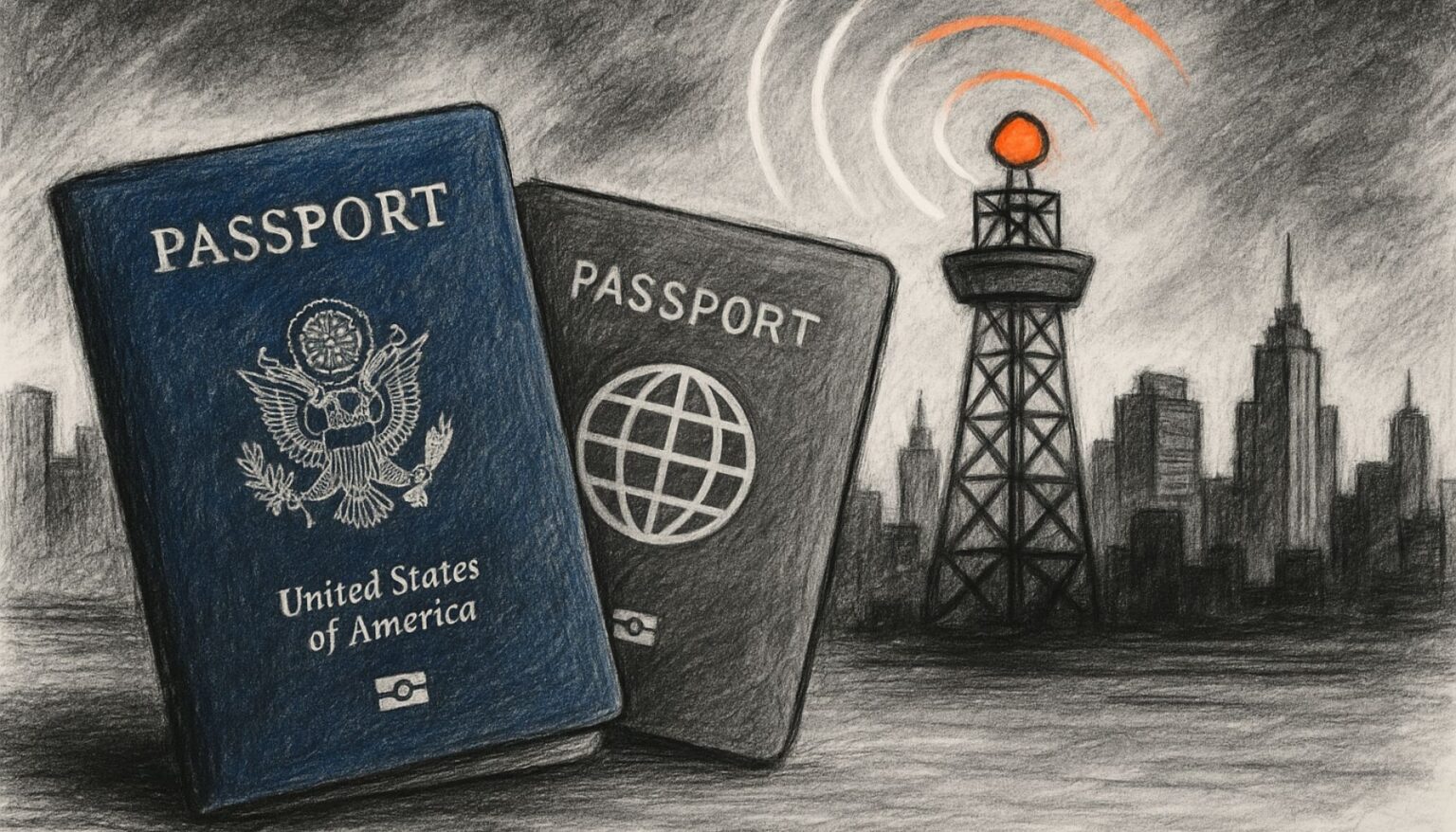What if your passport became a fiscal sentence, forcing you to pay nationality-based taxation, regardless of where you live?
That’s the question more and more people are asking in 2025. Moving to another country used to be the logical solution for those seeking financial freedom. But today, the landscape has changed: nationality-based taxation is no longer a rarity.
At Nomad Tax, we see it every day people like Laura, a Spanish copywriter who did everything right. She exited the tax system, moved to Paraguay, rebuilt her life. Now she wakes up to headlines that make her coffee shake:
“France proposes a global tax on citizens.”
“Spain considers adopting the U.S. model.”
“Europe moves to stop the capital flight of its nationals.”
What does this really mean? It means your passport might speak louder than your address. And unless you’ve cut ties in a formal and strategic way, you may still be on your home country’s tax radar.
This blog will explain what nationality-based taxation is, why it should concern you in 2025, which countries already apply it, who’s next in line, and most importantly: how to avoid nationality-based taxation before your freedom gets trapped by a law you didn’t even know existed.
Nomad, if your only plan is to move abroad, you’re at risk. Today, leaving your country is not the same as leaving its fiscal radar. And this blog is your roadmap, to make sure you never cross the wrong border again.

Indice del artículo
What is Nationality-Based Taxation and Why Should It Concern You in 2025?
The U.S. model: global fiscal control through your passport
When we talk about nationality-based taxation, we’re not speculating about future theories. We’re referring to a current, consolidated system operated by one of the world’s most powerful nations: the United States.
Under this model, it doesn’t matter if you live in Dubai, work in Singapore, or haven’t set foot in the U.S. for ten years. If you hold a U.S. passport, the tax authority considers you a taxpayer. Period.
This system is enforced through a complex legal and financial network known as FATCA (Foreign Account Tax Compliance Act), which compels banks around the world to automatically report financial data from U.S. citizens. It doesn’t matter if your income is generated overseas or if you never use services from your home country you remain under fiscal surveillance.
Every bank account, investment, and financial transaction is reported to the IRS. Failure to comply can lead to million-dollar fines, frozen accounts, and exclusion from the global financial system.
Renouncing your nationality is no easy task. It requires in-person appointments, consular interviews, a $2,350 processing fee, and if your assets or income exceed certain thresholds, you’ll face the dreaded Exit Tax, a levy on unrealized gains that can become a costly trap.
Eritrea, the forgotten precedent
While the U.S. uses sophisticated legal frameworks to keep its citizens taxable worldwide, Eritrea enforces it in a more direct and rudimentary way. Its system imposes a “diaspora tax” on citizens living abroad, fixed at 2% of their income.
Although many nations have condemned this practice as abusive, Eritrea has maintained it as state policy. It’s an extreme case, but it proves that the idea of taxing citizens based on nationality is not exclusive to developed or democratic countries.

Book your consultation with Nomad Tax.
Which Countries Are Considering (or About to Implement) Nationality-Based Taxation?
In 2025, nationality-based taxation is no longer a legal curiosity exclusive to the United States. Several governments are moving forward—through concrete steps or suggestive discourse—toward a model that taxes you not based on where you live… but on who you are.
And as we saw with Laura, even a well-planned expatriation, a clear tax residency, and a new life on another continent are no guarantee of freedom if your passport still ties you to the tax authorities of your country of origin.
France, Spain, and Italy: The Steps They Are Already Taking
Although France has not yet officially adopted a system of taxation by nationality, the signs are clear. Its 2024 Budget introduced tighter controls on those living abroad:
- Increased scrutiny of foreign-sourced income
- Stricter requirements to prove severance of ties with France
- Enhanced information exchange through the CRS
Moreover, the Finance Committee is considering a model inspired by the U.S.: taxing anyone who has lived in France for at least three of the last ten years, even if they are no longer tax residents. The goal: to prevent French passport holders from living in low-tax jurisdictions without contributing to the system.
In Italy, the reduction of the Non-Dom regime and increased oversight of expatriates with financial or family ties suggest a similar direction. They are not yet applying nationality-based taxation, but the political narrative is already moving that way.
And when it comes to advanced surveillance, Spain is ahead of the curve with its 2025 Tax Control Plan:
- Algorithms that cross-check your location, income, and spending habits
- Automatic alerts if your real life doesn’t match your “expected fiscal profile”
- A fiscal quarantine for those who have left the country but remain under the radar
This is the context in which Laura, now living in Paraguay, realized that physically leaving a country would not protect her from being taxed based on her passport in the near future.
While nationality-based taxation is not yet fully in place… the groundwork is already laid.
2025 List of Countries That Have Debated This Tax Model
These are some of the countries that according to official media, parliamentary reports, or legislative proposalshave publicly debated or proposed the implementation of nationality-based taxation (even if not yet enforced):
- France: under parliamentary discussion since 2023
- Spain: indirect control measures since 2024
- Italy: Non-Dom reforms and increased global monitoring
- Germany: isolated proposals from left-wing sectors in 2023
- Canada: occasional debates following reports on “wealthy expatriates”
- South Africa: possible reform discussed in 2022 under IMF pressure
Nomad, this list is not meant to scare you. But it is meant to help you stay ahead. Because if you’re thinking about your fiscal future only in terms of “I left the country, problem solved”… you might be in for a shock.
And we’re just getting started.

before it’s too late.
Leaving Your Country Is Not the Same as Leaving Its Fiscal Radar
Many nomads believe that moving abroad legally frees them from their home country’s tax system. That a foreign residence, a few new contracts, and a quieter life are enough to cut ties with the past. But that’s not always the case. Because while you’re making plans… your former country is still watching.
Laura thought she had done everything right: tax residency in Paraguay, paperwork in order, income declared. But she didn’t understand that “leaving the country” is not the same as leaving the fiscal radar. And in 2025, that mistake could cost you dearly.
So… how to avoid nationality-based taxation? To answer that, you first need to understand this:
The Difference Between Tax Emigration and Formal Expatriation
Physical emigration moving to a new country, starting fresh is only part of the process.
Formal expatriation, on the other hand, means a legal, documented, and accepted disconnection from the tax system of the country you’re leaving behind.
It’s not enough to stop living there. You must prove that:
- You no longer have significant economic ties (accounts, properties, active companies).
- You don’t reside more than 183 days (sometimes even less, depending on “center of interest” rules).
- You officially informed the tax authorities of your departure and completed all required legal steps.
- You have a new tax residency that is real, legal, and currently valid (not just a decorative piece of paper).
Changing Residency Is Not Enough to Avoid Nationality-Based Taxation
Nomad, more and more governments are making it clear that simply moving is not enough. They want solid proof that you are truly gone… and not just using a fancy address as a cover.
And the problem is, they don’t always notify you when they doubt your status. They just act:
- They block tax refunds.
- They initiate audits for “potential fiscal risk.”
- They place you on presumed resident lists.
Or, as in Laura’s case, they begin debating policies that will trap you based on your nationality, regardless of where you are.
How to avoid nationality-based taxation is not just about opening a bank account in another country. It’s about building a coherent structure: residency, company, accounts, movements. Everything must tell the same story. And that story must be credible, documented, and defensible.
What You Should Know Before Renouncing Your Nationality
When Laura started considering renouncing her nationality, she did so with a knot in her stomach. Not because of the paperwork, but because of everything it meant emotionally. Because nationality-based taxation doesn’t just affect your finances, it can make you feel like there’s no escape.
That’s why we recommend reflecting on the following questions, so the process can be as smooth as possible and help you stay out of your home country’s fiscal radar.
The 5 Key Questions to Ask Yourself Before Renouncing Your Nationality
1. Do I already have a second nationality or a clear path to obtain one?
You cannot become stateless. Before renouncing your nationality, you need a legal, solid, and valid alternative.
2. Will my renunciation be recognized by the country I’m leaving?
Some countries maintain fiscal ties even after formal renunciation especially if they detect inconsistencies in your financial activity.
3. Is my legal, banking, and personal structure aligned with this decision?
Changing your nationality is not enough. You need a coherent strategy that aligns your tax residency, asset structure, and financial accounts.
4. Am I emotionally prepared?
Because this isn’t just a legal procedure. It’s a break with your history, your culture, and often, with your family. And that, Nomad, doesn’t get processed with a signature.
5. Am I ready to face the fiscal consequences of leaving my country?
In some countries, renouncing your nationality is not the end of the game, it’s the start of a forced liquidation. From retroactive audits to phantom gains, you could be taxed on profits you haven’t even realized. And all of it… just for wanting to cut ties.
If you don’t know the rules of fiscal goodbye, you could leave, and lose.
Hidden Risks and Legal Consequences in 2025
In 2025, renouncing your nationality might seem like a smart move, but if it’s not well planned, it could expose you more than it protects you. Common risks include:
- Temporary ban from returning to your country without a special visa.
- Loss of acquired tax benefits like pensions or social security agreements.
- Banking restrictions if you don’t hold a second nationality recognized by international financial institutions.
- And the most invisible risk: living in fear of indirect retaliation, retroactive audits, visa complications, or being listed as a “suspicious expatriate.”
For Laura, this was the hardest part. Not because she wasn’t ready to leave the system, but because she realized it wasn’t just about paying or not paying taxes.
It was about regaining control of her life. About being able to breathe again, without feeling watched, just for holding the wrong passport.

How to Avoid Nationality-Based Taxation: Real Strategies for 2025
Nomad, understanding how to avoid nationality-based taxation in 2025 is not about hiding, it’s about planning smart, legally, and in advance. Because if the system considers you a taxpayer just for holding a passport, you’ll need more than just a plane ticket.
Coherent and Well-Documented Tax Residencies
Your first shield against nationality-based taxation is a real, legal, and coherent tax residency. A tourist visa, a rented address, or an Instagram photo won’t be enough. You need:
- A valid residence permit.
- Registration with the local tax authority (where applicable).
- Proof of real ties: contracts, bills, banking activity, community engagement.
Countries that do not tax foreign-source income, like Paraguay, Panama, Georgia, or the UAE, are excellent options if you seek tax freedom.
Legal Structures That Support Your Fiscal Narrative
A poorly structured offshore company is more of a risk than a solution. If you’re using one to avoid nationality-based taxation, it must be:
- Legally sound
- Established in a transparent jurisdiction
- Backed by operational substance
Only then can it help you invoice globally without triggering taxation tied to your passport.
The key lies in consistency between your tax residency, your company, and your banking setup.
If you live in Paraguay, have a company in Delaware, and operate through Spanish accounts — all of it must be documented, justified, and aligned. Because for fiscal algorithms, it only takes one mismatch in your story for red flags to go off.
The Power of a Second Nationality: A Passport as a Shield
When the problem is your nationality… sometimes the only real way out is another one.
Getting a second nationality is not just about mobility or status, it can mean the difference between paying taxes for a lifetime on something you no longer use, or starting fresh under a new legal framework. Countries like Paraguay, El Salvador, Mexico, or Turkey offer clear pathways — some through residency, others through investment — to obtain a second nationality.
An alternative passport is not a luxury. It’s a fiscal protection policy in a world where your nationality is increasingly seen as an unpaid debt. And in 2025, knowing how to avoid nationality-based taxation may come down to one thing: having a different flag that doesn’t charge you for who you are.
How to Avoid Nationality-Based Taxation in 2025 (Without Losing Your Mind)
Nomad, after everything you’ve seen, one thing is clear: nationality-based taxation is no longer a theory. It’s a real, expanding model. And many countries are already laying the groundwork. In this scenario, your fiscal freedom doesn’t just depend on moving — it depends on having a real strategy:
A coherent tax residency you can prove and sustain through documentation, lifestyle, and traceability.
Well-designed international legal structures — companies, accounts, and contracts that support your fiscal narrative.
A second nationality, if your current passport is starting to feel more like a sentence than a gateway. Because in a world that labels you by your origin, having an alternative is not just an advantage. It’s a shield.
And if you saw yourself in Laura’s story, then you already know: leaving is no longer enough. If your life doesn’t make fiscal sense… the system will find you. If you ever thought you were doing things right, only to realize that your passport spoke louder than your actions, then you’ve already taken the first step: you’ve realized this isn’t just about taxes.
It’s about sovereignty. And at Nomad Tax, we’re here to help you reclaim it.
📌 Book your personalized consultation and let’s design a fiscal architecture that works for you — before the system decides for you.



